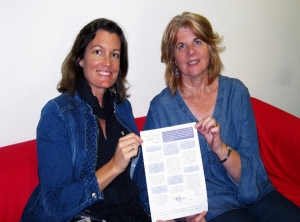In 2008, Dee Handyside was diagnosed with breast cancer. Within the next month, her sister and cousin were both diagnosed with the same illness.
Following a double mastectomy and chemotherapy, Ms Handyside developed additional growths on an ovary, resulting in a full hysterectomy and ovary removal.
While such an ordeal clearly has a significant physical impact, the experience had a profound effect on Ms Handyside’s mental health.
“At the time, my husband and I were living and working remotely and we had to lose the job of a lifetime, moving back to the mainland for my treatments,” she says.
“All of this, plus the worry of my UK family undergoing their own cancer treatments took its toll.
“To be honest, I lost my way mentally for quite a while.”
One of the most difficult challenges was being able to communicate with friends and family about her experience, and in turn, how they communicated with her.
“The biggest one for me was having to put up with comments that people thought were appropriate things to say – time and time again!
“‘A lot of it is your mindset, so you must think positive’ was a common phrase, but it actually dismisses the huge medical treatments and makes you feel weak if you dare to have a down day in what is a frightening, traumatic and draining time of your life.
“And it is purely down to the fact that people don’t know how to respond, so the standard comments – that they truly believe will help and give you hope – instead become so repetitive, and highly annoying.
“The thing to remember is that all of these deeds and comments were delivered with only one thing at heart – kindness.”
Ms Handyside says positive communication is a two-way street, and a fine balance of hope and reality, mixed with an underlying constant base of normality.
“I think that many people feel inadequate and fearful in their capability to engage.
“They don’t want to hurt or offend by saying the wrong thing. But what is the wrong thing?
“Everyone is different and there is no right or wrong way. Often, this fear forces people to stay away.
“It’s about both parties acknowledging cancer, but not wanting to give it the spotlight.”
While the lack of communication can leave those experiencing cancer feeling isolated, Ms Handyside drew on those feelings to motivate her to write and and record her own music, giving her focus and purpose.
It was after the completion of her first album, Genetics, that Ms Handyside decided to try to make a real change for those with cancer and their families.
Joining forces with local playwright, Briohne Skyes, the pair created the Silk Rags Project, a musical production which promotes positive communication between cancer sufferers and their families.
“It is a story of four friends, relationships and a cancer diagnosis.
“The play is comedy/satire, both funny and reflective, mixed with a wide genre of songs – from Orchestral Rock, Pop Motown through to Jazz/Swing and Country.
“The audience will laugh, cry, sing, clap and learn. They can return home to start conversations about this important communication topic, knowing that their donations will make a difference to cancer research.”
Ms Honeyside says the aim of the project is to enable community groups to collaborate on a performance to entertain, educate, start conversations, have fun and raise funds for cancer research.
“The Silk Rags Project’s aim is to enable community groups to collaborate on a performance to entertain, educate, start conversations, have fun and raise funds for Cancer Research.
“We strongly encourage liaison between theatre groups and their community groups such as Rotary, The Lions or CWA to assist in putting on an event, which could include an afternoon tea, cocktail and canapes, raffles and auctions with local business input.”
Following the original production, the pair held a Q and A session, assuming most attendees would ask about the create process.
“Instead, the first question was ‘So if we shouldn’t tell a cancer patient to keep positive, what should we say then?’
“This was a ‘eureka’ moment for Briohne and I as we realised that the underlying message behind both our play and music had been taken on board.”
As a result, Ms Handyside approached Dr Vanette McLennan from Griffith University, to create a one page handout, which aims to help people navigate the communication challenges with compassion.
“We trialled it with cancer patients and also those who had no experience of either the disease or anyone with a diagnosis.
“We knew that we had a duty of care to the cast, crew and audience and wanted them to go home and start conversations on their community.”
The Silk Rags Project will continue to perform around Australia, with plans to expand into the UK and USA in 2019.




